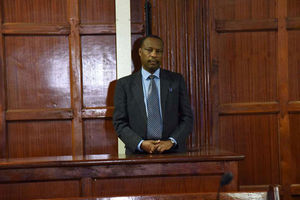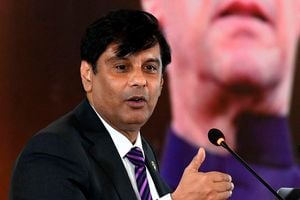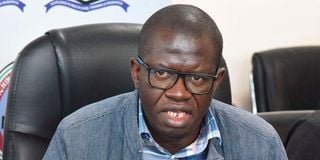
Chief Government Pathologist Dr Johansen Oduor during a press briefing at the Moi Teaching and Referral Hospital in Eldoret town, Uasin Gishu County on January 11, 2023, after he conducted a postmortem on the body of Edwin Kipruto alias Chiloba.
Imagine waking up every morning to spend the day with the bodies of the dead.
Depending on the circumstances in which one dies, it could be a subject of national discussion, but for the people who lose their loved ones, seeking some form of closure by knowing how or why they died is the most important thing to them.
Why does Chief Government Pathologist Dr Johansen Oduor love spending time with the dead? His answer is simple — because it matters.
“I love dead people. Compared to the ones who are still alive, dead people are harmless. You will always find them where you left them,” Dr Oduor said.
The pathologist, who has held the position since 2013, spoke to Sunday Nation in an exclusive interview about what it means to dissect a dead body, shocking findings and why there is need for more people in the profession.
Asked about the most shocking case he has handled, Dr Oduor said it is that of university student Rita Waeni.
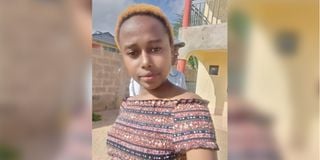
20-year-old Rita Waeni who was brutally murdered in a short-stay rental in Roysambu.
The Fourth Year student of Jomo Kenyatta University of Agriculture and Technology was brutally butchered.
The 20-year-old’s decapitated body was found in refuse bags at an apartment in Kasarani.
Her severed head was found in a dam in Kiambaa, Kiambu County.
Two Nigerian suspects arrested over Waeni’s death have been released on bond. The other suspect, who was caught on camera, is still at large.
“I had never seen such a brutal, painful and horrific murder in my entire career,” Dr Oduor said.
Ms Waeni’s murder, he said, was even worse than the horror he has seen while doing an autopsy on the 429 bodies of victims of the Shakahola cult in Kilifi County, in which believers starved themselves to death.
In Waeni’s case, Dr Odour said that the body of the young girl was cut into pieces with precision. The legs were chopped off at the hips and the contents of her stomach removed.
Dr Oduor said that her killers had used a hacksaw.
“Someone cut her with a sharp object then finished off with a hacksaw, which was used to cut through the bones. The killer scrubbed the deceased’s body thoroughly including her finger nails to get rid of the DNA. But we managed to pull out two nails which had been left behind, and this is very crucial evidence in our investigation,” he said.
Dr Oduor has hope that Ms Waeni’s killer will be nailed, even though no traces of DNA was found in the two finger nails.
Sunday Nation sought to know if he regards this as a “perfect crime” considering that the killer got away without leaving a trace of DNA.
“A perfect crime can only be said to be perfect once the trail runs cold, what I am seeing now is investigation are still ongoing,” he said.
“I will leave it at that.”
In the Shakahola case, on March 22 last year, the office of the Chief Government Pathologist received notification from the Directorate of Criminal Investigations (DCI) requesting the exhumation of bodies of two children who had been buried in a shallow graves after after starving to death.
Pastor Paul Mackenzie of Good News International Church, which was deregistered by the government, was accused of instructing worshippers to starve themselves to death “in order to go to heaven and see Jesus”.
The DCI had made an application for the exhumation of the bodies in at a magistrate’s court in Malindi.
“We have done 429 autopsies, so far, although we grappling with some challenges like the level of decomposition of bodies, the overwhelming number of cases, inadequate resources (depletion of reagents), the size of the mortuary and lack of cooperation from relatives of the deceased people. Some relatives do not want to give their DNA samples,” Dr Oduor told Sunday Nation.
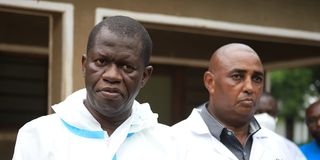
Chief Government Pathologist Johansen Oduor (left) and DCI Homicide Director Martin Nyuguto during a press briefing on the autopsies on the Shakahola cult death victims conducted on May 1, 2023.
He said that exhumation of bodies, which began in March last year and continued until November, will be resuming in a week’s time.
“I am very sure that we will find more bodies,” Dr Oduor said.
When we asked if Kenya has enough pathologists at county level, he said: “When we went to Shakahola in March last year there was no pathologist in Malindi. The only one available was in Kilifi town, and she was overwhelmed.”
To understand Dr Oduor’s love for the dead and his job, you have to go back to the sprawling neighbourhood of Mlango Kubwa, Eastlands, in Nairobi County.
Here, a young Dr Oduor loved watching crime scene investigation (CSI) movies and wanted to be the “man with the glasses” that unravels murders and pins down suspects by studying the victims of their brutality.
He confessed that the thrill of watching a team of exceptional forensic pathologists and scientists investigating heinous crimes and using their skills, wit and high-tech gadgets to catch the people responsible for the crimes was mind-boggling.
“I spent so much time watching CSI and how they got justice for dead people who had been murdered and I asked myself, ‘why can’t I be like these people solving these murders’?”
Dr Oduor said that there were many unsolved murders around where he lived. Families cried for justice that never came. That got him thinking that perhaps he could one day do something about it.
“The news was always awash with stories of people being murdered every day, especially in Eastlands where I grew up. Many times I would see and hear loved ones crying for justice which never came, and so I decided to use science to find them justice,” he narrated.
“My curiosity was also sparked by the death of former Foreign Affairs Minister Dr Robert Ouko in February 1990 in Koru, Kisumu. There was a lot of speculation surrounding his death and funny stories about how he died,” Dr Oduor added.
The chief pathologist said that although he grew up in abject poverty and hardship, this did not stand in the way of his quest to pursue medicine and then he specialised in pathology.
His brilliance, sheer hard work and resilience coupled with the benevolence of well-wishers and scholarships would catapult him to the gates of the University of Nairobi after he scored A’s at St Aquinas High School.
“I would walk for 15 kilometres,” he said, going down memory lane.
Dr Oduor pointed out that since he was a child, he had always known that he would study medicine. After completing his degree course at the University of Nairobi, he proceeded for further studies in the same field in South Africa.
“I was driven by passion for medicine. When I got to campus, I discovered that many students who were also doing medicine courses chose other specialisations and were not interested in pathology. This sparked more interest in the field.”
In his long profession, Dr Oduor said, he had learnt that human beings misunderstand death and the place of pathology.
“In the minds of human beings, they tend to think that once you bury someone the problem is gone. Well, if foul play is suspected when a person is buried, we will exhume the body and establish the cause of death. There is no escape,” he said.
“I once did an autopsy on a body which had been buried for a year. The rotting corpse was exhumed from the grave, and we found that the individual had been poisoned. We found the poison in the remains. As a result, the person who committed the offence was jailed for murder.”
Dr Oduor said that people make wrong assumptions that all a pathologist does is postmoterms.
“Pathology is a laboratory science. It is about being in the laboratory, managing strategy, diagnosis and everything else in the lab,” Dr Oduor said.
“In fact, nowadays my job is mostly about documenting the causes of death and going to court to present forensic evidence on behalf of the State.”
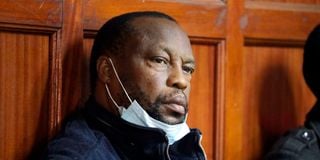
Former chief government pathologist Moses Njue in court on June 21, 2022.
He credits his former boss, the late Moses Njue, for helping him rise to the helm of the pathology division at the Ministry of Health. Mr Njue died in November last year after a long illness.
Dr Oduor, who succeeded Dr Njue, described his former lecturer at the University of Nairobi as a mentor who shaped his pathology career, and later as a colleague.
“My then boss, Mr Njue, saw potential in me and made me his assistant after which I took over from him when he left to date,” he said.
Dr Oduor told Sunday Nation that although he spends most of his time with dead people, if not in court helping in the search for justice by painting a picture of how a person died, he sleeps very well like a healthy baby. He said that he has not developed any mental health issues.
A close friend who knows Dr Oduor well said that you will find him enjoying nyama choma and ugali after a hard day’s work.
“If you look at me, do I look like a disturbed person?” He asked.
“When I was at the University of Nairobi, I spent two years working on a dead body every single day and dissecting it while doing a course unit called Human Anatomy. It was then that all the fear vanished because you realise you need to pass exams,” Dr Oduor said.
He noted that every evening after dealing with dead bodies, they went for debriefing on what they had seen and how they were dealing with it, and that helped a lot.
When Sunday Nation asked Dr Oduor what he does in his free time, he said: “I do things like other normal human beings.”
“I read a lot. I don’t think there is a day that goes by without me reading. I sit with friends in social places. I love music and travelling. I do things just like any other human being,” he added.
Dr Oduor, however, did not want to be drawn into a discussion about his family.
“I love keeping my private life private,” he said.
Dr Oduor said that many Kenyans think that he works on dead bodies alone. He said that there are other well qualified pathologists who are doing a good job.
“It’s just that I work on many high-profile cases. I prefer to handle them myself, that’s why,” he explained.
On the “noises” that are sometimes made when working on high-profile cases, Dr Oduor said that maintaining credibility has been very important throughout his career.
“Before I start a high-profile autopsy, I usually ask the family of the deceased to look for an independent pathologist so that we can do the procedure together. In all instances, whatever a family’s preferred pathologist says always corroborates my findings.
“This is science,” he said, adding his approach helps a lot.
He has, however, also learnt that when people “make noise”, they usually do not know the details of what they are working on.
Dr Oduor said he has an open-door policy, and no one has ever complained about the findings he has made after an autopsy.
“If anyone wants to observe when I am doing an autopsy, they are free to do so. We allow that because it is a transparent process,” he said.
Dr Oduor said that apart from science being very rigorous and thorough, exhumation is team work and takes a multi-sectoral approach.
Even after doing his job for nearly two decades, Dr Oduor said that he is still fascinated.
He insists on two rules; first, everything is by the book and, secondly, the dead must be given all the dignity.
All members of the human family, he said, possess inherent dignity and equal and inalienable rights, the recognition of which is proclaimed by the 1948 Universal Declaration of Human Rights.
He said that authorities must respect, protect and guarantee the dignity of the dead in line with international law.
He further explained that in criminal matters, and in situations where it is suspected that a person was buried to conceal murder, the law must be applied. The doctor cites Article 26 of the Constitution of Kenya 2010 states that first every person has a right to life and also that a person shall not be deprived off life intentionally, except to the extent authorised by the constitution or any other written law.
That why, he said, while digging up bodies in the Shakahola case, they had to be meticulous in their work.
So what has the doctor learnt, thus far?
The pathologist said that over the years he has learnt that it is difficult, if not almost impossible to get anything wrong in the line of his work.
“It’s difficult to give wrong results in pathology because you are working on what you can see. If it’s an injury, you are seeing an injury,” he said.
Along the way, Dr Oduor has become better at his job. He said: “You become better and do better on the next body.”
And his biggest lesson: “Life is sacred, take care of your life, live life to the fullest but ensure you live it well and avoid unnecessary risks,” he said.


